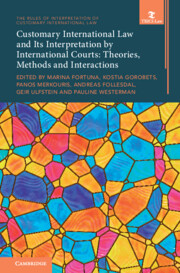This edited volume is the result of the teamwork of the TRICI-Law project, the PluriCourts Centre, and the Department of Transboundary Legal Studies of the University of Groningen. The volume had its origins in the second TRICI-Law conference, Interpretation of Customary International Law: Methods, Interpretative Choices and the Role of Coherence, co-organised by those teams and held in The Hague in December 2021.
The TRICI-Law project, headed by Professor Panos Merkouris, is a five-year research project funded by the European Research Council (ERC) Horizon 2020 programme (Grant Agreement No. 759728). The project is dedicated to in-depth study of customary international law (CIL) interpretation and identification of the rules that guide this process. It is the first of its kind, introducing the lens of interpretation as a distinct aspect to be studied in the life cycle of a CIL rule.
The PluriCourts Centre for the Study of the Legitimate Roles of the Judiciary in the Global Order studies the legitimacy of international courts and tribunals (ICs) from legal, political science and philosophical perspectives. The Centre examines the normative, legal and empirical soundness of charges of illegitimacy in order to understand and assess how ICs do, could and should respond. It also explores the multidimensional legitimacy standards, which include multilevel separation of authority, independence and accountability, performance and comparative advantages.
The Department of Transboundary Legal Studies of the University of Groningen is a unique mix of legal and political philosophers, international lawyers, technology lawyers and other scholars who transcend the traditional boundaries of the legal domain. Since its formation in 2017, the Department has contributed especially to the collaborative work of the sections of legal philosophy and international law on the topics of customary international law, authority of international law and international legal normativity.
The conference had an ambitious aim. We invited international legal scholars, legal philosophers and practitioners to address some of the trickiest questions regarding the interpretation of customary international law. To what extent do internationally accepted principles of legal interpretation provide general guidance on how to interpret CIL, thereby guiding and restricting ICs’ discretion? What are the methods of interpretation of CIL used by ICs? Are there commonalities and patterns in the ways that ICs belonging to different fields of international law interpret customary rules? How do interpretative choices in CIL interpretation vary across ICs? And finally, do ICs strive for coherence in their interpretation of CIL, or does coherence serve as a method or a guiding principle rather than a goal?
The call for papers for the conference attracted a lot of interest, and we were particularly delighted to see that many of the abstracts submitted offered insights into CIL and its interpretation that bridged international law and legal philosophy. This was testament to the fruitful collaboration between the disciplines, which also informed the composition of the organising committee and the overall philosophy of the conference. Therefore, in our selection of abstracts, we tried to strike a balance between, on the one hand, contributions that discussed broader conceptual issues of CIL and its interpretation and, on the other, contributions that engaged in a more narrowly focused and practice-oriented analysis. The conference, and ultimately the chapters of this edited volume, reflect this balance.
The edited volume comprises thirteen chapters, divided into three parts. Part I is dedicated to traditional conceptual issues of CIL and its interpretation. The contributions in this part scrutinise both orthodox and modern theories of CIL and their critiques; they look at the conceptual image of the interpretation of state practice; address the problem of the chronological paradox and its impact on the interpretation of CIL; explore the possibility of plural sources of CIL; and offer an entropic approach to CIL interpretative dynamics. Part II takes a closer look at some of the interpretative choices that ICs make when engaging with CIL. The contributions in this part discuss the use by ICs of logic and reason in their approach to CIL interpretation; look at examples of CIL interpretation more specifically in investment arbitration; and examine the role of judicial dialogue and judicial activism in the identification and interpretation of CIL. Part III shifts the focus to the place of CIL in the normative universe of international law, thus putting the spotlight on the interaction between CIL and other sources of international law. The chapters in this part scrutinise the interplay between CIL, treaties and general principles of law and issues of reconciliation of conflicting norms. This part also enquires into the different roles that coherence plays in ICs’ interpretative practices.
We thank the contributors of this edited volume for their thorough and ambitious texts, which will doubtless advance the understanding of the interpretation of CIL. We also thank the other speakers and chairs at the 2021 conference, whose presentations and comments inspired many of the discussions developed in this volume. We are particularly grateful to His Excellency Judge Liu Daqun for his keynote speech on CIL interpretation by international criminal courts and tribunals.
This edited volume continues a set of publications dealing with a wide variety of issues connected to CIL interpretation. We are very grateful to Cambridge University Press for publishing this research collection as the TRICI-Law Book Series. We are also indebted to Ms Marianne Nield for her invaluable assistance and unending patience in the preparation of this volume and those that are still to come, and to Mr Tom Randall and the Cambridge University Press editing team for their unfailing support throughout the publication process. A special mention is owed to the ERC and the University of Groningen, without whose generous financial help this edited volume, as well as the TRICI-Law Book Series, would not have been possible.
This publication has been made open access thanks to generous funding from the European Research Council (ERC) under the European Union’s Horizon 2020 Research and Innovation Programme (Grant Agreement No. 759728) and the University of Groningen.

